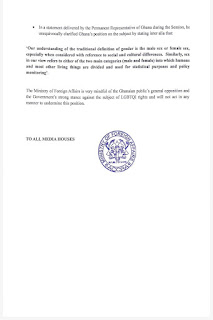The Ministry of Foreign Affairs has refuted claims that Ghana abstained from a vote supporting LGBTQI rights at the 59th Session of the Human Rights Council (HRC59).
Widespread criticism on social and traditional media had accused the government of abandoning its firm stance against LGBTQI activities, with many suggesting Ghana avoided taking a clear position on a resolution seen as endorsing LGBTQI rights. However, in a statement released on Wednesday, July 9, the Ministry clarified that no such vote on LGBTQI rights took place.
The Unknown Break Down Of Mahama’s ‘No Fees Stress’ Policy - Read Full
“The issue before the Council was whether individuals identifying as LGBTQI should be protected from violence and discrimination—not about endorsing LGBTQI rights,” the statement explained. It added that Ghana’s decision to abstain was in line with Chapter 5, Article 17 of the 1992 Constitution, which prohibits discrimination based on gender, race, colour, ethnic origin, religion, creed, or social and economic status.
The Ministry also noted that Ghana’s Permanent Representative at HRC59 reaffirmed the country’s position on gender identity, recognizing only male and female genders.
“Our interpretation of gender remains rooted in the traditional definition of male and female, considering biological and cultural distinctions. Similarly, ‘sex’ refers to the two main categories—male and female—used for statistical purposes and policy monitoring,” the Ministry quoted the envoy as saying. The Ministry of Foreign Affairs has dismissed reports that Ghana abstained from a vote endorsing LGBTQI rights at the 59th Session of the Human Rights Council (HRC59).
Social and traditional media have been awash with criticism, with some accusing the government of softening its long-held stance against LGBTQI activities. Critics claimed Ghana deliberately avoided taking a firm position on a resolution perceived as supporting LGBTQI rights.
But in a statement issued on Wednesday, July 9, the Ministry clarified that the vote in question was not about LGBTQI rights as widely speculated. “The matter before the Council concerned whether individuals identifying as LGBTQI should be protected from violence and discrimination—not about promoting LGBTQI rights,” the statement read.
Ghana’s Gold Reserves Soar to 32.99 Tonnes in June, Quadrupling Since 2023 – BoG
It explained Ghana’s abstention was consistent with Chapter 5, Article 17 of the 1992 Constitution, which prohibits discrimination based on gender, race, colour, ethnic origin, religion, creed, or socio-economic status. The Ministry further indicated that Ghana’s Permanent Representative at the session reaffirmed the country’s position on gender identity, recognizing only male and female sexes.
“Our understanding of gender is based on the traditional definitions of male and female, which take into account biological and cultural distinctions. Likewise, ‘sex’ refers to the two main categories—male and female—used for statistical and policy purposes,” the envoy was quoted as saying.



